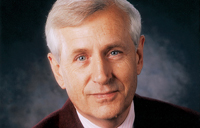Where does Russia fit in the new world order? That is what University of Quebec political science Professor Jacques Lévesque will discuss as part of the Royal Society of Canada Governor General Lecture Series at Glendon Wednesday.
A Fellow of the Royal Society of Canada, Lévesque will deliver his talk, “Russia’s Search for a new Place in the World Order”, Feb. 13 at 7pm at the BMO Conference Centre, Glendon Hall, Glendon campus. The lecture will be in French with  simultaneous translation into English. To RSVP, e-mail events@glendon.yorku.ca.
simultaneous translation into English. To RSVP, e-mail events@glendon.yorku.ca.
The lecture will review the achievements and limits of Moscow’s endeavors and its prospects for the future. It will also assess the opportunities and constraints for the “new beginnings” of relations between the United States and Russia, as sought by the Obama Administration.
Jacques Lévesque
“For two years after the fall of the USSR during a short period of intense idealism and high expectations typical of revolutionary situations, Russia’s top leaders vowed to ‘join the ranks of the civilized world’, to use their own terms,” says Lévesque. “For having willfully destroyed communism, they expected Russia’s rapid integration to the European Community and NATO, and massive economic help. Together with the disasters brought by the ‘shock therapy’, many disillusions were bound to happen.”
With the expansion of NATO, first in Eastern Europe and later in the former Soviet space, Russia’s relations with the US underwent a gradual and quasi-constant deterioration that peaked in 2009. Even before Putin became president in 2000, top advisers to Yeltsin were convinced that preventing the resurgence of a Russia as a significant world power (even at a regional level) was a major goal of US foreign policy.
In 2008 and 2009, books were written about a “new Cold War” between Russia and the US. “Such a characterization is seriously off the mark,” says Lévesque. “Aware of the enormous power gap between Russia and the US, Putin’s purpose has been to develop or support poles of resistance to US hegemony in world affairs, in order to restrain its margins of maneuver.”
At the same time, Russia has remained careful to avoid confrontations with the US. This is reflected in the so-called “strategic partnership” between Russia and China in the framework of the Shanghai Cooperation Organization and the “special relationship” that Russia wants to develop with the Arab and Muslim world, says Lévesque. “At a higher level, this is also the goal of the new Brazil-Russia-India-China grouping.”
A Chevalier de l’Ordre National du Québec and member of the Order of Canada, Lévesque was invited to expert briefings in 1985, 1987 and 1989 for the then-Secretary of State for External Affairs of Canada Joe Clark. He was also a special adviser with the Canadian Permanent Mission at the United Nations in the fall of 1984 and June 1988. In addition, he lived in Moscow for eight months in 1975 as a research associate at the Institute of the USA and Canada of Academy of Sciences of the USSR. A Killam Fellow from 1992 to 1994, Lévesque was president of Royal Society of Canada: The Academies of Arts, Humanities & Sciences of Canada from 1993 to 1996. In June 2000, he was awarded the title of Chevalier de la Légion d’Honneur by the Jacques Chirac, president of France.
About the Royal Society of Canada
The Royal Society of Canada: The Academies of Arts, Humanities and Sciences of Canada (RSC) was established under an Act of Parliament in 1882 as the senior Canadian collegium of distinguished scholars, artists and scientists. The primary objective of the Society is to promote learning and research in the arts, the humanities, and the social and natural sciences. As a national, bilingual organization consisting of more than 2000 Fellows and more than 40 institutional members from every  province, the RSC is Canada’s National Academy.
province, the RSC is Canada’s National Academy.
For more information about the lecture, contact the Office of the Principal at Glendon at 416-487-6727.


